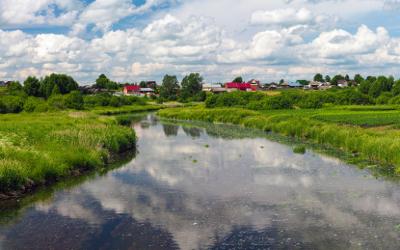OU experts ask: Why aren’t we exploiting sustainable agriculture’s emission-reducing potential?

Professor David Gowing from the OU’s Floodplain Meadows Partnership argues governments are missing a huge opportunity by failing to make sustainable agriculture a crucial part of their policy response to the climate crisis.
We must take urgent action to avert the climate crisis, but governments’ tendency for quick and simple solutions to the highly complex challenge ahead of us poses a significant risk. Knee-jerk, short-term fixes almost always lead to unintended and unwanted long-term consequences.
As a headline, planting 18 million trees to capture excess carbon from our atmosphere makes sense. But have we stopped to think what would happen if we covered more of the country with woodland? If done without adequate consideration, even the best-intentioned tree-planting programme might disrupt existing habitats, their biodiversity and, importantly, reduce the land available for our already under-pressure food supply.
Changing what we eat and how it gets on our plates will be critical to curbing carbon emissions, but we must be honest about how challenging this will be and understand what the alternative means. Reducing meat and dairy consumption is essential, but the fact people felt their civil rights were at risk when KFC in the UK recently ran out of chicken shows that overcoming our addiction to cheap meat will require long-term cultural change. Moreover, a plant-based diet is not automatically sustainable. Soy production has already caused massive deforestation in the Amazon, while the thirst for dairy alternatives has bloated the Californian almond industry to the point of wreaking havoc on bee populations and disrupting precious water supplies. We also mustn’t forget that in many parts of the developing world, where people don’t have access to supermarket shelves stocked with vegetable proteins, dairy and meat products may not be an ethical choice but a dietary necessity.
Why land sparing is not always the answer
Climate policy often overlooks land use’s impact on our climate, but it will be fundamental to whether we succeed in meeting our targets or not. A scientific fact omitted in policies such as the UK Government’s Net Zero Strategy to decarbonise the UK economy by 2050 is that well-managed grassland soils can store more carbon than woodland soil. In fact, according to our early research, the soil in carefully managed meadows can hold as much as twice the carbon as most types of woodland.
The idea of taking land out of agriculture to manage it solely for nature-conservation and carbon capture has received backing from those advocating re-wilding activities, such as reforestation. Early indications suggest that the Environmental Land Management Scheme (ELMS), which is about to replace the EU’s Common Agricultural Policy in the UK, may continue to incentivise this approach now the country has left the EU. However, for every square metre of productive farmland lost, farmers must work harder to maximise yields elsewhere. In practice, this often means using large amounts of artificial fertilisers and pesticides, damaging the soil, making it less fertile, more prone to erosion and flooding, and releasing carbon into the atmosphere. The approach also often goes hand in hand with intensive methods of livestock rearing, which prioritise feeding our demand for cheap meat over animal welfare and the environment.
But there is a better way, and it has been around for a very long time.
Floodplain meadows: a sustainable nature-based solution
Until around 100 years ago, floodplain meadows were crucial to a type of land sharing that offered solutions to a significant number of the environmental challenges we face today. These meadows found alongside many British rivers capture carbon, play a vital role in absorbing floodwater and trapping sediment whilst producing sustainable food. In addition, thanks to the sediments floods deposit, these systems need no artificial fertilisers. Meadows can contain more than 40 different plant species per square metre and are an essential nectar source for pollinating insects, such as bees. They also provide livestock with sustainable grazing during the autumn and hay during the winter.
Sadly, intensive farming, urban and industrial development has seen more than 97% of floodplain meadows disappear during the past century, and today only 3,000 hectares remain. Just imagine how much stored carbon this has released into our atmosphere. Since 2007, my OU environmental scientist colleagues and I have spearheaded an innovative collaboration with Natural England, Natural Resources Wales, the Environment Agency, The National Trust, and other partners to research, promote and restore these unique meadows across England and Wales. Among other projects, this Floodplain Meadows Partnership recently won a substantial grant from Ecover to restore 50 hectares of floodplain meadows along the banks of the River Thames in Oxfordshire and further study the potential for floodplain carbon storage.
Still, we’re a long way from exploiting this nature-based solution to its full potential. England and Wales would need at least 70,000 hectares of floodplain meadows to start positively affecting flood prevention, climate mitigation and our food supply. Rather than incentivising farmers to grow crops ever more intensively, we should encourage them to work in harmony with the natural world in the same way as previous generations.
Governments have the power to make this happen, but they need to be honest with us and stop selling simple sound-bite solutions to the most significant challenge facing humanity. Making farming sustainable requires systemic change and long-term support for farmers. In the UK, identifying floodplain as a critical land type in ELMS would be an excellent place to start. As would the UK Government’s firm commitment to invest in restoring our lost freshwater habitats, such as floodplain meadows. It’s also time we face the fact that addressing the climate crisis means turning our back on the unsustainable intensive farming that has suppressed the real price of food for too long and that we will feel it in our pockets. But this is a price we cannot afford not to pay.
Related content
- Learn more about the Floodplain Meadow Partnership
- Read about OU’s Environment, Earth and Ecosystems research
- Find out about degrees in Environmental Science
- Explore postgraduate opportunities in the School of Environment, Earth and Ecosystem Sciences
- Want to create your own meadow? Check out our OpenLearn resources
- Learn more about the importance of haymaking on OpenLearn
Contact our news team
For all out of hours enquiries, please telephone +44 (0)7901 515891
Contact detailsNews & articles

Open Research Week to spotlight innovation in 2026
Open Research Week will return from 16–20 March 2026, uniting Open University researchers and partners to explore how open practices drive engagement, innovation and societal benefit.